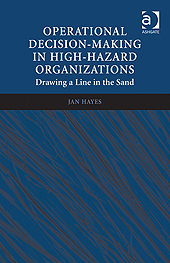Operational Decision-Making in High-Hazard Organizations
- Publisher
- Ashgate
- Price
- $99.95
- Authors
- Dr Jan Hayes
Summary
Drawing a line in the sand
This book describes research on safety-related decision-making by operations supervisory personnel in three different high-hazard industries, and features a case study illustrating each: a chemical plant, a nuclear power station and an air-navigation service provider.A large body of research about industrial decision-making already exists, but the focus is almost invariably control-room operators, field staff and other frontline personnel. Another large body of research about managerial decision-making covers strategic issues. The focus of this research is quite different and unique: those who supervise the frontline personnel and essentially provide the organizational link between senior management and minute-by-minute system operations.
-
Contents: Foreword; Preface; Introduction; Theoretical perspectives on making safe decisions; Part A Decision-Making in Three High Reliability Organizations: At the nuclear power station - ‘We put a line in the sand’; At the chemical plant - ‘If it’s not safe, we don’t do it’; Air traffic control - ‘When you kick a ball, you don’t know where it’s going to land’. Part B Acting Both as Employees and as Professionals: Decision-making and identity; Rules and compliance; Professionals at work; Professional relationships; Decisions, risks and barriers; Creating environments for better decision-making; References; Index.
-
About the Author: Jan Hayes has 25 years’ experience in safety and risk management. She holds a Senior Research Fellow appointment at the Australian National University where she is Program Leader for the social science research activities of the Energy Pipelines Co-operative Research Centre. Dr Hayes is a member of the Advisory Board of the Australian National Offshore Petroleum Safety and Environmental Management Authority.
Review: "This book is an enormously valuable addition to the literature on high reliability organizations."
Andrew Hopkins, Emeritus Professor of Sociology, Australian National University, Canberra
Publication Date May 28 2013






.png)

.jpg)
